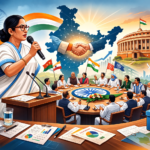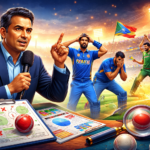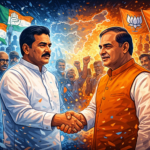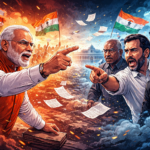At a key meeting, Pakistan PM Shehbaz Sharif tells Putin he respects Russia–India ties but seeks closer Russia–Pakistan relations.
Diplomacy is a bit like juggling. You can’t drop the balls, but sometimes you have to smile even while tossing them in the air. And in Beijing, Pakistani PM Shehbaz Sharif just tried to juggle India, Pakistan, and Russia—all while thanking Putin for his balance. 🎪
In the circus of geopolitics, Russia is the ringmaster everyone wants on their side.
What Actually Happened?
During the Shanghai Cooperation Organisation (SCO) summit in Beijing, Pakistan’s Prime Minister Shehbaz Sharif sat down with Russian President Vladimir Putin for a bilateral chat. The timing was important. With global tensions high and regional rivalries heating up, every handshake and every sentence matters.
Sharif didn’t waste time. He acknowledged Russia’s close ties with India—a long-standing partnership built on trade, defense, and mutual respect. But he also pitched for a deeper Russia–Pakistan partnership, promising that Islamabad wanted to strengthen bonds with Moscow.
Putin, in turn, gave the usual diplomatic assurance: Russia values ties with Pakistan and will work closely to enhance them.
Why This Meeting Matters
Russia has always been India’s “time-tested friend.” Defense deals, energy projects, and cultural exchange have cemented this bond. Yet, Pakistan has been trying to find its own entry point into Russia’s foreign policy.
Sharif’s message was clear: we respect your ties with India, but don’t forget us. This balancing act is important because:
- Russia–India relations are strong, but Moscow cannot ignore Islamabad forever.
- Pakistan–Russia ties have been slowly growing, especially in energy and defense talks.
- China’s presence adds spice to the mix—Beijing supports stronger Russia–Pakistan cooperation as it fits into its own regional chessboard.
The Delicate India Factor
Here’s the tricky part: whenever Pakistan cozies up to Russia, India naturally watches closely. Sharif’s statement that “we respect Russia’s relations with India” was a carefully placed olive branch.
It was his way of saying: “Don’t worry Delhi, we’re not trying to steal your best friend. We just want to share the friendship circle.”
But in geopolitics, sharing is not always caring.
What Sharif Actually Said
Sharif’s words were diplomatic poetry:
- He thanked Putin for supporting Pakistan and for efforts to maintain balance in the region.
- He acknowledged Russia’s important partnership with India.
- He insisted that Pakistan wanted “very strong relations with Russia” too, which would benefit the whole region.
It was like telling a friend: “We totally get you hang out with your old buddy a lot. But hey, you and I could be besties too!”
Russia’s Balancing Role
Putin, of course, played the role of the polite guest. He assured Sharif that Russia values Pakistan’s ties and will continue to strengthen them.
But behind the polite smiles, Moscow is juggling:
- India is a major defense partner and energy buyer.
- Pakistan is a gateway for new trade routes and an ally in certain security dynamics.
This is the classic balancing act of Russian foreign policy.
The Bigger Picture: Why SCO Summit Matters
The SCO is no ordinary tea party. It’s a platform where Asian giants like China, Russia, India, Pakistan, and Central Asian states meet to discuss security, economy, and strategy.
So when leaders hold side meetings, the ripples extend beyond the photo ops. For Pakistan, this was about showing it is relevant in big-power politics. For Russia, it was about keeping every door open.
(For context, you can check how the SCO has reshaped Eurasian diplomacy on United Nations overview of regional blocs.)
India’s Quiet Watch
India didn’t issue any direct statement on this meeting, but rest assured, the chai cups in Delhi were clinking a little louder.
Why? Because whenever Russia entertains Pakistan, New Delhi wonders if Moscow’s loyalties are shifting. The reality, however, is simpler: Russia is playing both sides. It wants to keep India close while not shutting the door on Pakistan.
The Entertainment Value of Geopolitics
If politics had a Netflix series, this episode would be titled “The Balancing Act.”
- Pakistan wants to look important.
- Russia wants to look neutral.
- India wants to ensure nothing spoils its long-standing friendship with Moscow.
And the audience—China, the US, and Europe—is watching carefully, popcorn in hand. 🍿
Why You Should Care
This isn’t just about handshakes and headlines. The Russia–India–Pakistan triangle impacts:
- Defense deals: Who buys arms from whom?
- Energy security: Who gets discounted Russian oil and gas?
- Regional peace: How South Asia balances security in the shadow of global conflicts.
A Strong Call-to-Action
Geopolitics isn’t just for diplomats—it shapes your petrol bill, your news cycle, and even your Twitter arguments. So stay curious, stay informed, and most importantly—share this blog with your friends. After all, good gossip isn’t just for Bollywood—it’s alive and thriving in international politics too. 🌍
Suggested Related Post
👉 “What’s Trump Doing with All That Tariff Revenue?”













